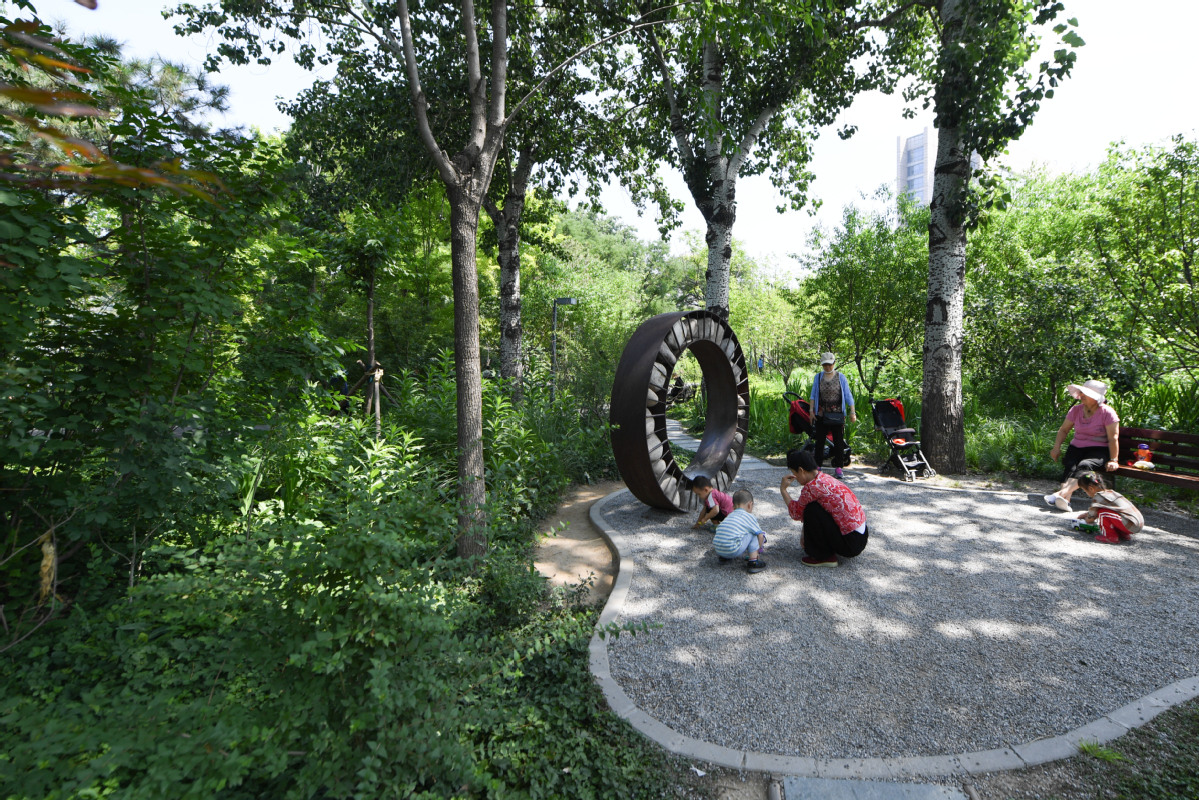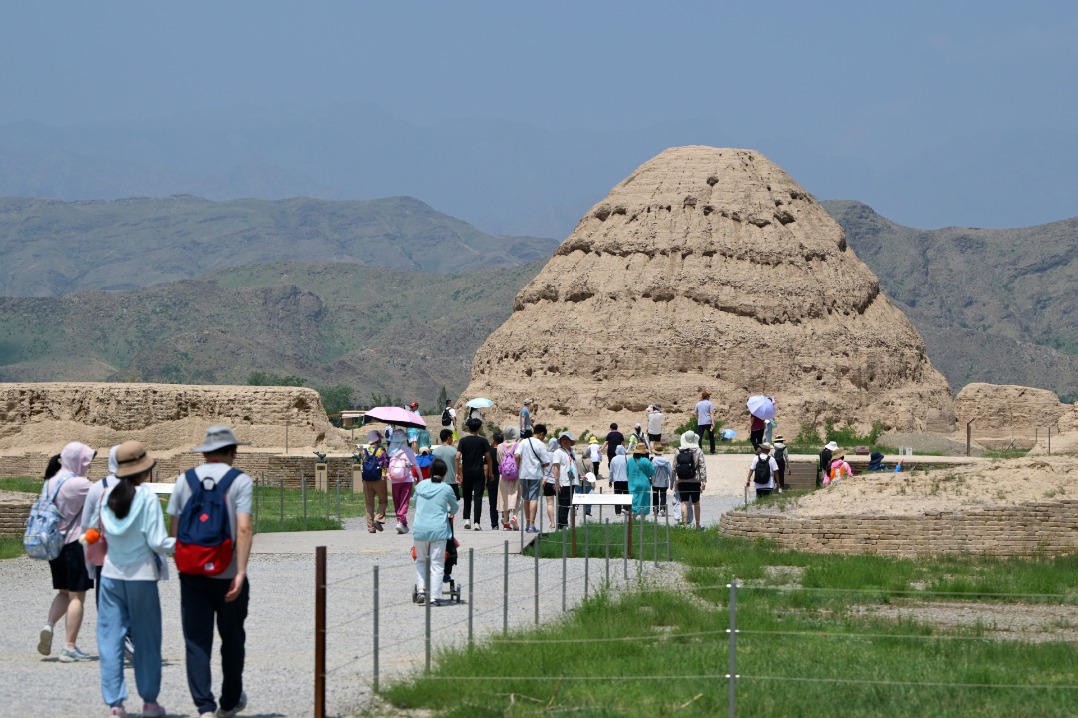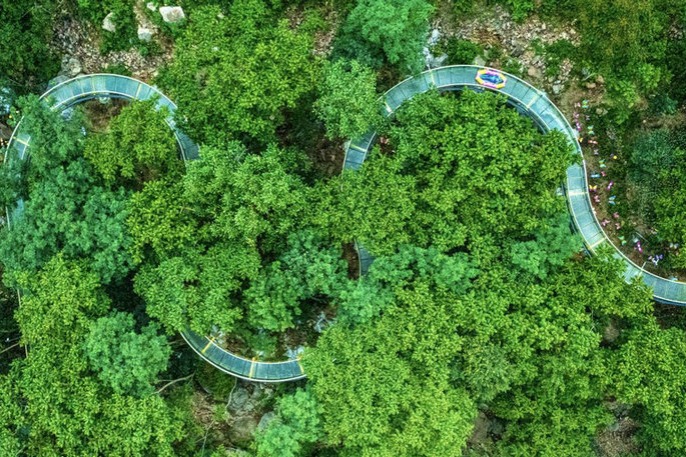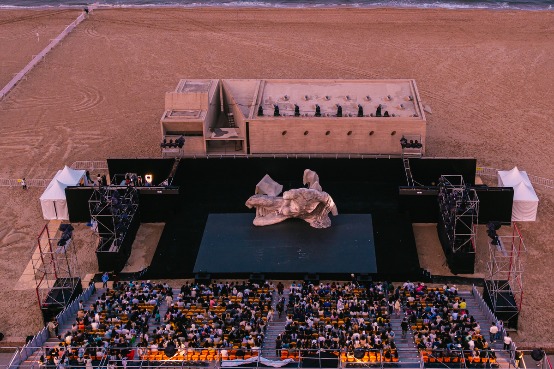Oasis is a breath of fresh air in city center


BEIJING - On a sweltering Beijing evening, groups of people young and old streamed into a street garden at the heart of the city through its inconspicuous entryways.
Stepping in one of the door-wide gates, a separate world emerges away from the city's hustle and bustle. Layers of green foliage flourish along the meandering pathway, and little clearings with special designs appear from time to time when the moon sheds light on the benches.
Located within a golden district not far away from the populous city's financial business center, the garden named Guangyanggu was built as the biggest urban forest in the center of Beijing amid the city's bid to expand the coverage of green for a better environment.
Gone are piles of trash and old shabby buildings, as the city forest emerged on land which people living nearby used to try to get away from. A tank of oxygen and a bay of quietness, the 4.4-hectare garden also offers a space for activities such as enjoying nature, exercising and spending leisure time with loved ones.
In one of the little clearings, a middle-aged woman smiled watching her 3-year-old son play with pebbles. "I take my son here every day," says Liang Lihong, adding that many parents would take their children to the garden so they can play with each other.
"The living environment is getting better and the city is greener. This is happiness, isn't it?" Liang says smiling under the yellow light.
With sweat soaking her back, Yang Yuqing, a senior high school student, was jogging among the crowd of people walking on the soft pathway. Glad to find a place close to home for fitness, she says, "The air is very fresh here. You can tell the difference immediately when you get in here from the main street."
What residents are less familiar with was the math behind the green transformation as the land could have been used for commercial purposes, raking in over 10 billion yuan ($1.45 billion), says Lu Yingchuan, an official of Xicheng district.
Lu and his colleagues also made calculations on urban function reduction, environmental protection, historical and cultural heritage and people's happiness. "If we build a 'concrete forest' on the land, the city scene will be greatly degraded," Lu says. "We are determined to build the city forest to optimize the ecology and offer people more room for leisure and fitness."
"There are too many concrete buildings in the city. It's nice to have green and natural places like this," says Li Wei, a 35-year-old technician who used to work long hours.
Li and his friends used to drive hundreds of kilometers to the countryside just to enjoy short-stays close to nature. Li recalls that he once shared photos of the park with his friends and invited them to guess where he was. "I was right within the second ring road; it's so impressive," Li speaks with pride.
"With more gardens, people are in better moods. Earning money cannot end up, but health is more important," Li says, believing there will be more green spaces in cities and it is only a matter of time as life is getting better.
In fact, the city forest is just one example of Beijing's campaign to create more oases closer to people's homes. The city has built more than 500 small street gardens and green spaces, and plans to build another 41 leisure parks this year.
Beijing is not alone in striving to increase urban afforestation. Small street gardens have sprung up nationwide on old dusty wastelands, spaces spared from the demolition of rambling or illegal buildings as the government and people work together.
In Wuhan, citizens can make suggestions on where to build street gardens. More than 100 people in Yangzhou of eastern Jiangsu province have volunteered to help maintain the ecology of 17 street gardens by watering and tending plants, spraying pesticides and killing weeds regularly.
Unlike 30 years ago when people were eager to migrate to cities, Chinese citizens today are more drawn to the bucolic life in the countryside in addition to enjoying green breaks in metropolises.
A total of 26.57 million netizens are attracted by a string of videos released by food blogger Li Ziqi on Sina Weibo, China's Twitter-like platform.
Li Ziqi, often dressed in graceful traditional garments, rises at sunrise and rests at sunset, planting seeds and harvesting flowers, cooking Chinese dishes and making bamboo furniture. "This is the life I yearn for," says a top comment on Li's Weibo post.

































